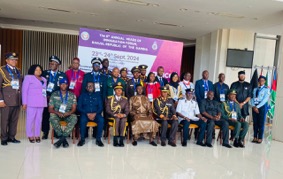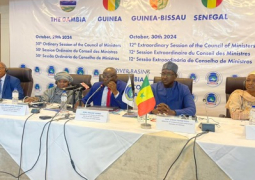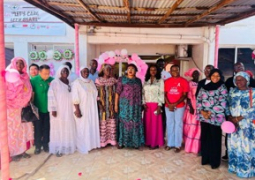
The confab, hosted by the Gambia Immigration Department (GID) on Monday, was held under the theme: ‘Acceleration of the Deployment of the ECOWAS National Biometric Identity Card (ENBIC) and the Abolishing of the 90 Days Stay Limit/Resident Permits for Community Citizens’.
The annual event is a two day convergence that brings together heads of immigration and councils within the ECOWAS member states.
Director General of GID, Bai Ebrima Mboob, highlighted that the event provides them with an exceptional platform to address the critical issues surrounding free movement of community citizens, challenges and migration governance in the region.
“As we converge here today, we are not only reaffirming our collective commitment to the principles of regional integration but also recognising the vital role immigrations play in fostering socio economic development across, within and among ECOWAS.
“The Gambia Immigration Department (GID) remains deeply committed to ensuring the domestication and enforcement of the ECOWAS Free Movement Protocol, which serves as a foundation for the rights of ECOWAS citizens to move freely, reside, and establish where desired, sans frontiers.”
“We have come a long way in implementing these regional obligations, and our progress in areas such as the issuance of biometric identification documents, border control, and mobility management stands as a testament to our collective dedication on agreements and policy decisions.”
Speaking on behalf of the Minister of Interior, Hon Bubacarr Boye, the minister for Public Service, said the heads of immigration have been instrumental in bringing together senior officials from across the region to address the challenges and opportunities in migration and border management. “The forum has emerged as a vital platform for harmonising our policies, addressing mobility issues, and promoting the full implementation of ECOWAS free movement protocol.”
“This protocol remains a powerful tool for fostering socioeconomic growth and Gambians are proud to play a role in advancing its objective.”
Chairperson of the ECOWAS Heads of Immigration, Mr Kemi Nanna Nandap, said the ambition to implement free movement had existed in the ECOWAS undertaking, when the abolition of obstacles to the free movement of persons, goods and services was first identified in the 1975 formation stage.
“The 1979 protocol on the free movement of persons right of residence and establishment was the first protocol to be ratified by its member states. The ECOWAS initiative provided for the progressive implementation for the right of entry, residence and establishment for community citizens within the region to be completed in three phases within fifteen years,” she explained.
She further recalled that “the first phase of the right to entry and stay for up to 90 days to allow ECOWAS citizens with valid travel documents and international health certificate to enter the territory of other ECOWAS states without visas and entry permits was implemented. In the second phase right of residence has been rendered possible via the introduction of residence permits. However, the third phase of right of establishment remains in progress,” she revealed.”
She urged them to initiate strategies to strengthen the regular and proper way of free movement.





